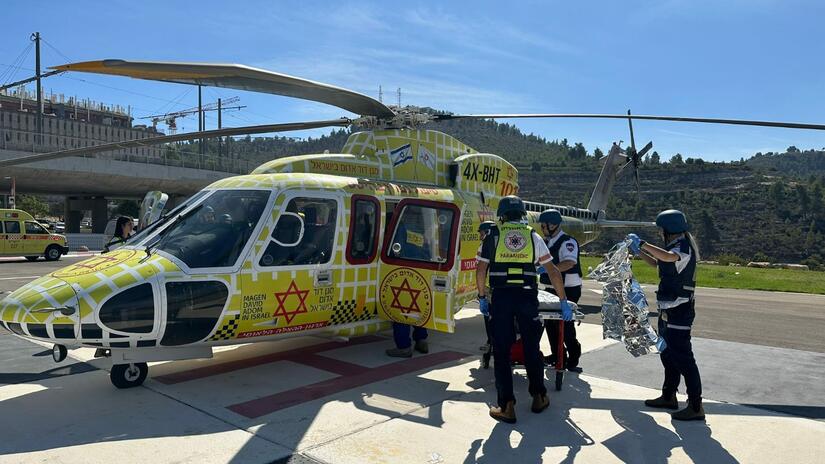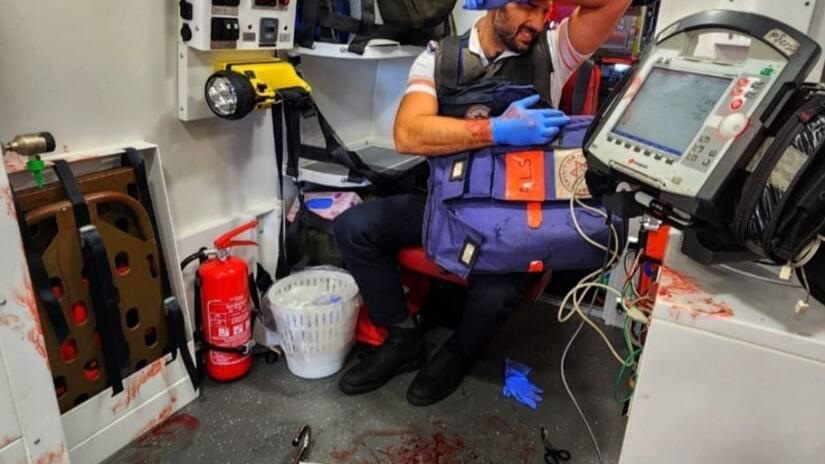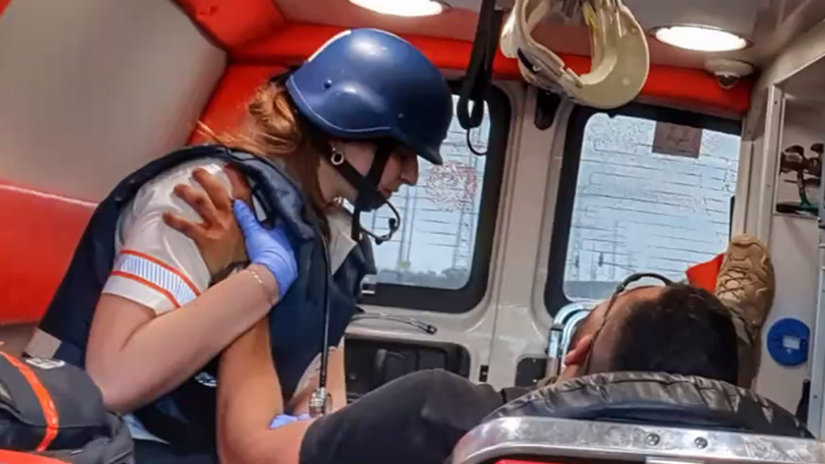As sirens blare over the surrounding neighbourhood — alerting people about incoming rockets — a paramedic with the Magen David Adom (MDA) lies flat on the ground, shielding herself in case a missile should land nearby.
“This is what we have to do when sirens go off and we're not in a building,” says Dani, a paramedic with an MDA ambulance team. “We just have to lie on the ground and cover our heads.”
“I'm grateful that while I'm on shift I have a helmet and a vest to protect me but it's still terrifying,” she says. “It's so much scarier than I could have imagined. Despite this fear, I'm not going to let anything stop me or the MDA teams from getting to people in need.”
Since the escalation of hostilities on October 7, numerous MDA staff members, including several ambulance team members, have been killed in the line of duty — and many more have been injured. In addition, the MDA has also incurred losses of medical equipment, including numerous ambulances, ruined due to incoming fire.
The sound of sirens, flying rockets and nearby explosions are something many MDA paramedics know all too well. And they are well aware of the dangers they represent.

MDA paramedic helicopter crews have also faced many dangers as they brought care to people impacted by the fighting.
Photo: Magen David Adom
‘The helicopter started spinning’
A paramedic who works with a MDA helicopter unit, Shafir Botner recalls a harrowing moment during that already horrific day when his crew narrowly escaped death. It happened while they were transporting three critically wounded people from a place where fighting was still going on.
“We were told there were three critically wounded people on the ground and that we must take them or they wouldn’t survive,” he recalls.
The crew landed, worked quickly to stabilize the patients, brought the wounded on board and were preparing to take off when suddenly there was a loud explosion.
“Rockets kept flying overhead,” he said. “Within ten seconds I heard a massive explosion. I was sure we were hit by a rocket. And in a split second the helicopter started spinning in all directions. I was able to hold on and scream into the radio that we were hit.”
“Later I found out that debris had hit our rotors and the helicopter lost its balance. If not for our incredible pilots, I wouldn’t be here today.”
The sound of falling rockets
The continuing threat of rocket fire and other potential attacks take a heavy emotional toll on paramedic teams as well. After all, they’ve seen many times what the weapons of war can do. Talal Abu Jameh, a senior emergency medical technician at the MDA, recalls an episode on the first day of the war that has left an indelible mark on his heart and mind.
"I was standing at the [MDA] station, when I suddenly heard a very loud boom and saw black smoke,” says Talal, who is Muslim and lives with his family in a Bedwin community in the Negev.
“I drove there quickly and on the way my son called me,” he recalls. “I heard a lot of shouting in the background, I heard him say "he's dead, he's dead". I got there and proceeded on foot. The family was there. I saw my cousin, only four years old, lying unconscious on the floor.
“It was clear to me that he was very seriously injured, I evacuated him in an ambulance to the hospital, where unfortunately he was pronounced dead. Then I realized there was no choice and even though everyone in my family was traumatized by the incident, I knew I had to be part of the team. And so I went back to work.”

Ambulance crews have worked tirelessly under stressful and often traumatic circumstances.
Photo: Magen David Adom
‘They’ve given their all’
MDA has been supporting affected communities since the beginning, with ambulance and medical services on call 24/7. A total of 1,500 ambulances and 10,000 first responders (EMTs and paramedics) have been mobilized. Since 7 October, they have treated over 4.000 patients.
“The volunteers and staff of Magen David Adom have been given it their all in the past weeks. Despite the many dangers, they did everything in their power to save lives, “ says Birgitte Bischoff Ebbesen, regional director at IFRC for Europe and Central Asia.
“This despite the fact that the conflict has affected many MDA-members personally. They have lost friends, family members and coworkers due to the violence, and their stories are heartbreaking.
Regardless of their own sorrows and hardship, many MDA-members have found space in their hearts to continue helping others. This is truly remarkable and inspiring.”





